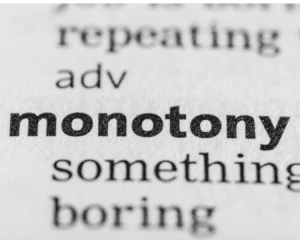
At first glance, routine is comforting. It brings predictability and structure. But what happens when sticking to them makes you feel more robotic than restored? Nothing is “wrong,” but nothing feels alive either. This is the silent drain of monotony, a psychological state where life feels emotionally muted. This may not seem like an immediate or an obvious stressor but according to recent findings, these can act as a low-grade chronic stressor affecting our energy, focus and self-worth. When the days become very similar, the mind can start to disengage giving way to brain fog and a sense of meaninglessness to start to creep in.
This also throws light into why high-functioning individuals unknowingly fall into the “achievement trap” of routine, where consistent productivity is associated with purpose. But beneath the disciplined exterior, individuals still report disengagement and mental exhaustion or fatigue from living the same day over and over. But it is also important to note that monotony is not always a result of boredom or having too little to do. It can stem from mental overload, emotional suppression and a lack of autonomy. You always feel detached from the kind of work you engage in, as even though it is a lot of work, maybe it is not what aligns with your energy, values or creativity.
Our brain looks out for stimulation and novelty. When routine becomes overly rigid or uninspired, it leaves no room for creativity, spontaneity, or emotional release. Without variation, your body and brain stop experiencing the small dopamine spikes that make everyday life feel rewarding. The brain here switches to autopilot and we often end up not paying much attention to the task at hand thereby affecting our motivation and productivity levels. Due to a lack of space for creativity, this can limit one’s cognitive flexibility and their ability to generate innovative ideas. This also eventually affects our quality of life, making it important to acknowledge and understand these effects.

Restoring vitality in daily life
Cultivating mindfulness: mindfulness allows us to focus on the present moment, which can help in making day to day activities more engaging and less tiresome. Introducing rhythm and engaging in activities such as yoga, rhythmic breathing can help you shake the mental fog and at the same time re-engage with our bodies. Mindfulness can reawaken our senses thereby bringing more depth and meaning to even ordinary routines. It is also recorded to stimulate attention and cognitive flexibility which allows us to engage with life more creatively.
Reclaim your autonomy: monotony comes with a perceived loss of agency. Even within routines, you can reclaim moments of choice. These might seem small, choosing your outfit mindfully, curating your own playlist or changing your walking route. Personal agency inserted into daily rituals can send powerful signals to the brain which can help with this perceived loss. Even journaling: Which parts of your day feel energizing vs. draining? Can help in auditing your week and see where changes in space or tasks might help.
Engage socially: social interaction can act as an antidote to monotony. It can be friends, family or colleagues, engaging with them can reduce feelings of isolation and provide stimulation to our brains. It often reminds us that while tasks may be repetitive, human experiences don’t have to. These interactions need not be intense; even short, intentional interactions can make all the difference.
Sometimes we wait for vacations or life milestones to feel alive again. But vitality often comes from reconfiguring our relationship with the everyday. The dishes, the emails, the commutes, they don’t need to change. But how we meet them can. The goal is never to escape routine, as routine provides us with stability and predictability required to swiftly navigate our day to day tasks. Here the requirement is to renew your emotional relationship with our routines. While keeping in mind the benefits of a routine, introducing small but consistent acts of self-connection, curiosity, and permission to feel. Over time, these tiny moments become anchors. These can start with choosing music that moves you, or saying yes to a walk in the evening. The routine doesn’t have to disappear, it simply needs to hold more of you in it.

